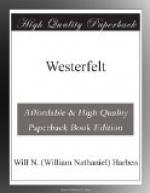“Well, I won’t close my two eyes,” affirmed his wife. “I hain’t seed ’er, nur I don’t intend to, ef I kin git out of it.”
When supper was ready they softly moved their chairs to their places and sat down. Mrs. Slogan didn’t eat heartily, but Peter’s appetite seemed normal. They had finished eating, Peter had secured his toothpick from the broom, and they had moved back to the fireplace, when they heard a stealthy step on the passage floor near the door. The bolt was turned, the door shutter creaked and moved a few inches. A hand came in sight, and something wrapped in brown paper was tossed into the centre of the room. Then the steps receded, and they heard the widow resume her chair.
Peter rose curiously and picked up the parcel, and bringing it to the fire opened it. Its contents were a pair of woollen socks and a pair of stockings of the same material. On the first had been worked a big red letter “P” and on the other a capital “C.”
“Did you ever?” gasped Mrs. Slogan. “I don’t believe she’s a bit more crazy ’n I am.”
“I never ’lowed she wus,” said Peter, with a laugh. “I jest thought she mought be harder to manage ’an you, that’s all.”
“Sister’s gone an’ had a change o’ heart!” declared Mrs. Slogan, ignoring his joke. “Nothin’ else could a-made ‘er come back an’ give us these things. I heerd they had a big revival over thar. Oh, Lordy, I do feel so relieved!”
“Well, I reckon we mought as well go in an’ pay ‘er our respects an’ git started,” grumbled Peter. “I’m not a-goin’ to tote ’er meals about, I’ll tell you that. Slavery day is over.”
“No, we’ll jest let ’er alone,” Mrs. Slogan beamed; “she’ll know we mean all right by the supper, an’ I reckon she’ll move up ’er cheer in the mornin’; ef she don’t, I’ll blow the field-horn.”
Peter lighted another pipe. “I wonder,” said he, “how long it’ll be ‘fore you an’ her ‘ll be clawin’ agin. Religion ur no religion, crazy ur no crazy, women is jest the same.”
Chapter XXII
When Westerfelt went to bed that night after his talk with Mrs. Bradley about the conversion of Mrs. Dawson, it was with a certain lightness of heart and buoyancy of spirits that he had not experienced for a long time. He did not know exactly how his new feeling would show itself in regard to Harriet, but he believed he might, in time, cease to look upon her love for Wambush as such an unpardonable offence. “Surely,” he argued, “if Mrs. Dawson can forgive me for all I have done, I ought to pardon the girl I love for what she did before she knew me.”
These were admirable intentions, but he was counting on a depth of nature that was not his either by inheritance or cultivation. The inflammable material was still bound up in his breast, and it needed but one spark to fire it. What he was struggling against had come down to him from a long line of ancestors, men who would rather have died than brook the thought of a rival, especially in an inferior; men who would have spurned the love of their hearts if it were stained with falsehood under any circumstances, and when, as it was in Westerfelt’s case, the provocation was not only deceit, but ardent love for such a man—ah, there was the rub!




